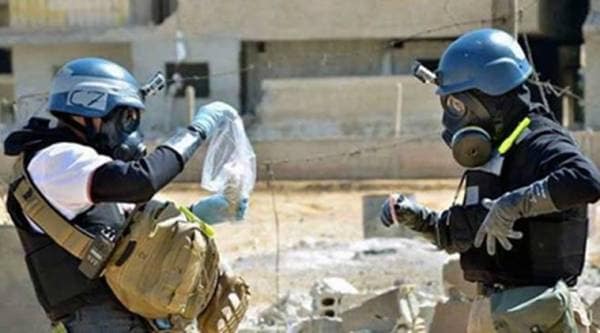Redraw the Red Line
It’s time for signatories of Chemical Weapons Convention to re-affirm their commitment.

Officials investigate a chemical weapons attack. The repeated use of chemical weapons represents a grave threat to the Chemical Weapons Convention and the rules-based international order that keeps us all safe. (File Photo)
Politicians shake hands and smile. Cameras click. Papers are signed and stamped. The world’s press reports the signing of another international agreement.
International summits, conventions and treaties may seem far removed from the lives of everyday people; photo opportunities rather than practical route maps. But these are how we agree to the type of world we want to live in and the rules we want to live by. They are the promises we keep to each other. Our commitments and their implementation underpin the international system and keep us safe. When agreements are broken, or allowed to fall into irrelevance, the consequences become very real for everyone.
The Chemical Weapons Convention is one of these, but there are worrying signs we have forgotten why we worked so hard to achieve this vital agreement, which entered into force 21 years ago.
Chemical weapons asphyxiate, choke, blister and poison. Even when not lethal, their effects can last a lifetime. During the 20th century, they were used on and off the battlefield with horrific consequence.
During the First World War, more than 90,000 soldiers suffered painful deaths following the use of chlorine, mustard and other chemical agents. Almost a million more were blinded, disfigured or received debilitating injuries.
Chemical weapons (CW) were also used with devastating consequences in Morocco, Yemen, China and Abyssinia (now Ethiopia). The aftermath of their deployment in the 1980s Iran-Iraq War continues to be felt today, with 30,000 Iranians still suffering and dying from the effects of the agents used in the conflict. I witnessed the scars still suffered by Iraqi Kurds from Saddam’s CW attack on Halabja almost two decades previously.
When the Chemical Weapons Convention came into force, it brought the Organisation for the Prohibition of Chemical Weapons (OPCW) into existence. For the first time, the world had an independent, non-political body to investigate chemical weapons use. One hundred and ninety-two countries, including India, have now ratified the Convention and are States Parties to the Chemical Weapons Convention.
The international community has agreed that the development, production, stockpiling and deployment of these instruments of death should be confined to the past. There can be no impunity for anyone who uses chemical weapons.
Just over 20 years on from this watershed moment, and five years after the OPCW was awarded the Nobel Peace Prize for its extraordinary achievements, this agreement and these norms are under threat. Since the start of 2017 alone, chemical weapons have been used against civilians in Syria, Iraq (again), Malaysia and the UK.
The repeated use of chemical weapons represents a grave threat to the Chemical Weapons Convention and the rules-based international order that keeps us all safe. It must now be protected and strengthened.
Answering the call of the UK and other states, the OPCW announced that the signatories of the Chemical Weapons Convention will come together on June 26 and 27. We are calling on states around the world, including India, to join together to find ways to strengthen and protect this cornerstone of the international non-proliferation and disarmament regime.
Some have tried to cast this meeting as an arena for some kind of global confrontation where states will be forced to take sides, or a position on this or that attack. That is not the purpose. Rather this is a choice between the rule of law and international rules-based system vs anarchy and the terrifying prospect that we might see chemical weapons become normalised.
Twenty years ago, the creation of the Chemical Weapons Convention marked a turning point in global politics. The world drew a line in the sand, and agreed that any use of chemical weapons is unjustified and abhorrent. We must not allow that line to be obliterated.
The writer is the British High Commissioner to India.
For all the latest Opinion News, download Indian Express App






































No hay comentarios:
Publicar un comentario